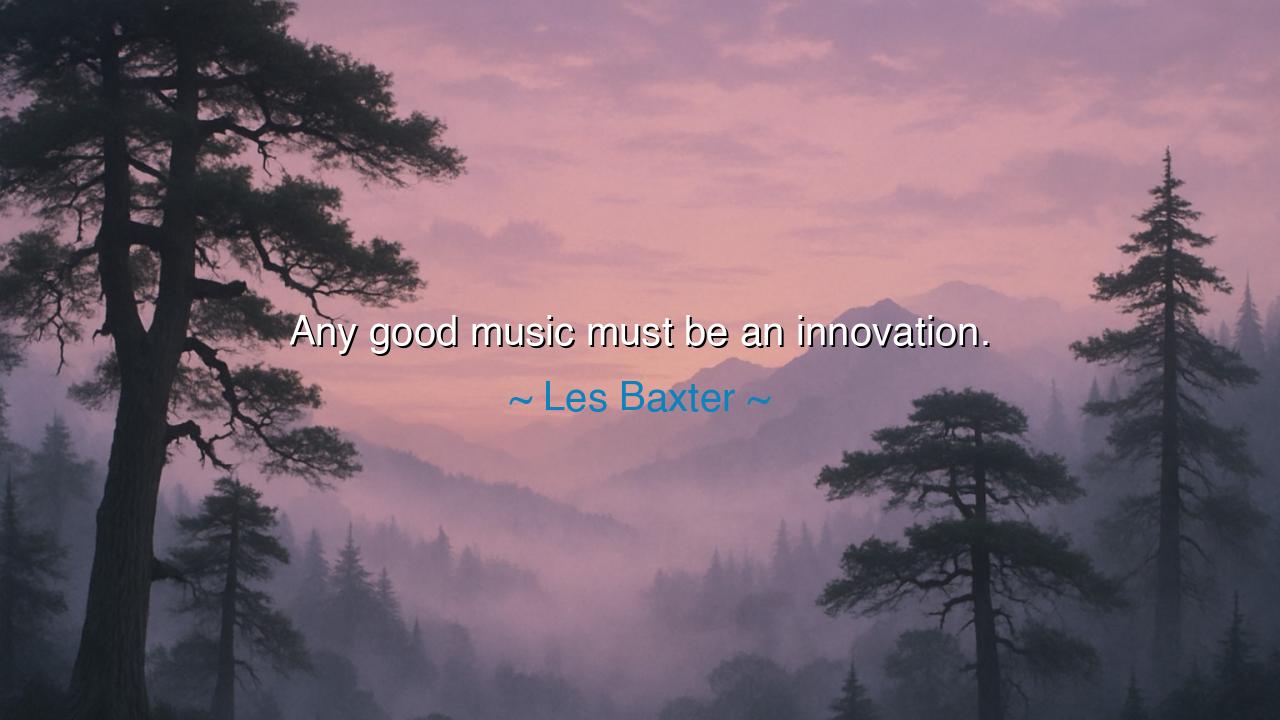
Any good music must be an innovation.






The saying of Les Baxter, “Any good music must be an innovation,” resounds like the notes of an eternal lyre, carried upon the winds of time. These words do not merely describe the craft of melody—they reveal the very nature of creation itself. For what is music, if not the language of the soul? And what is the soul, if not restless, ever yearning to break beyond old boundaries, to fashion new sounds, new visions, new worlds? In Baxter’s words, we find not only a law for the artist, but a teaching for all who seek to live with power, with beauty, and with daring.
The origin of this thought belongs to a man who carved his place in the strange currents of twentieth-century sound. Les Baxter, master of innovation, blended classical traditions with exotic rhythms, electronic waves with primal chants. At a time when others clung to the safe shores of convention, he ventured into the uncharted oceans of tone. His music was not content to repeat what had already been sung. Instead, it demanded new colors, new shapes, new spirits. Thus, in his own life, he proved the truth of his words: that good music cannot be stagnant, but must be alive, ever-moving, like fire that consumes the old wood and rises anew in flame.
Consider the tale of Ludwig van Beethoven, who stood upon the precipice of despair when his hearing, the very essence of his craft, began to fade. Many would have surrendered. Many would have turned their face away from the art that mocked them with silence. But Beethoven, aflame with spirit, turned his suffering into strength. In his deafness, he heard new realms of sound that no mortal had yet dared imagine. He gave to the world symphonies that shattered the walls of tradition, thundering forth like storms of divine power. That is the mark of innovation: to defy the chains of circumstance, to create that which the world did not know it lacked until the moment it heard it.
So too, in every age, the greatest music—whether the chants of monks in stone cathedrals, the ragged cries of blues singers on the Mississippi, or the fierce thunder of drums in distant tribes—has been born from innovation. It is not imitation that moves the heart; it is the new spark, the bold departure, the strange note that awakens the sleeping soul. Just as rivers carve valleys by seeking new courses, so must art carve its path by breaking old patterns. Without innovation, music dies, turning into a hollow echo of what once was alive.
The wisdom here reaches beyond sound and melody. When Baxter proclaims that all good music must be innovation, he speaks also of life itself. For to live well, one must not merely repeat the steps of those who walked before. Each generation must bring forth its own song, each soul must dare its own improvisation. Life becomes dull and silent when we cling only to what is safe and known. But when we embrace risk, when we dare to strike new chords, when we sing with voices untried, we discover beauty that would never have existed otherwise.
The lesson, then, is simple yet profound: seek always to innovate. Do not be a mere echo of the past, nor a shadow of another’s work. Instead, strive to add something new, however small, to the great song of existence. Let your words carry freshness. Let your deeds bear originality. Let your spirit bring forth melodies that the world has never heard before. For only then will your life be like good music—resonant, powerful, unforgettable.
In practice, this means daring to experiment, even at the cost of failure. Learn from those who came before, but do not be bound by their walls. If you paint, paint with colors unseen; if you write, write with a voice not yet heard; if you build, build with designs that challenge the eye. Even in the humble rhythms of daily life, innovate—find new ways to show kindness, new ways to pursue growth, new ways to awaken joy in others. In this way, you honor Baxter’s wisdom, and you let the song of your life rise beyond the ordinary.
Thus, remember this: Any good music must be an innovation. To repeat is to echo, but to innovate is to create. And creation, in its purest form, is the breath of the divine made audible. Take these words, carry them as a melody in your heart, and let your life be a song no one else could have sung but you.






AAdministratorAdministrator
Welcome, honored guests. Please leave a comment, we will respond soon